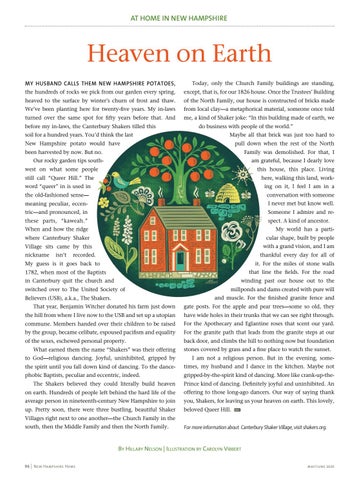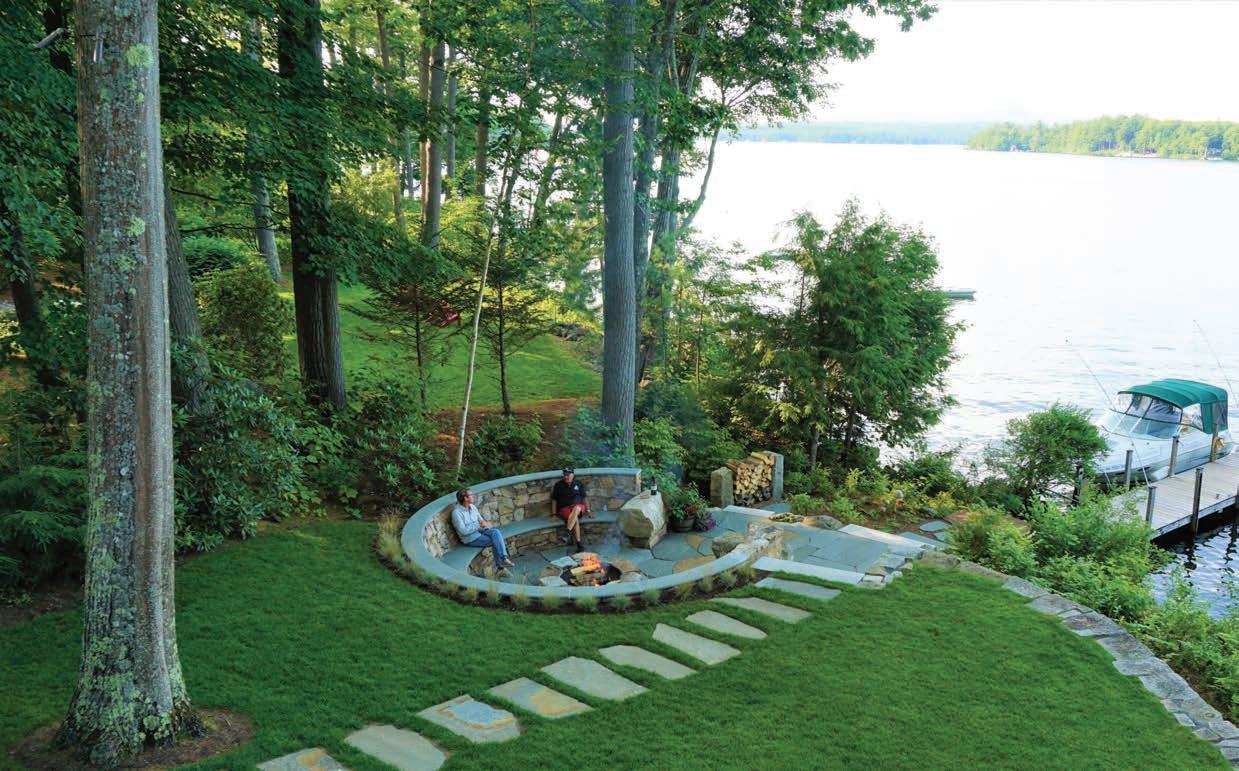at home in new hampshire
Heaven on Earth My husband calls them New Hampshire potatoes,
Today, only the Church Family buildings are standing,
the hundreds of rocks we pick from our garden every spring,
except, that is, for our 1826 house. Once the Trustees’ Building
heaved to the surface by winter’s churn of frost and thaw.
of the North Family, our house is constructed of bricks made
We’ve been planting here for twenty-five years. My in-laws
from local clay—a metaphorical material, someone once told
turned over the same spot for fifty years before that. And
me, a kind of Shaker joke: “In this building made of earth, we
before my in-laws, the Canterbury Shakers tilled this soil for a hundred years. You’d think the last
do business with people of the world.” Maybe all that brick was just too hard to pull down when the rest of the North
New Hampshire potato would have been harvested by now. But no.
Family was demolished. For that, I
Our rocky garden tips south-
am grateful, because I dearly love this house, this place. Living
west on what some people still call “Queer Hill.” The
here, walking this land, work-
word “queer” in is used in
ing on it, I feel I am in a
the old-fashioned sense—
conversation with someone
meaning peculiar, eccen-
I never met but know well.
tric—and pronounced, in
Someone I admire and re-
these parts, “kaweah.”
spect. A kind of ancestor.
When and how the ridge
My world has a parti-
where Canterbury Shaker
cular shape, built by people with a grand vision, and I am
Village sits came by this nickname
isn’t
thankful every day for all of
recorded.
it. For the miles of stone walls
My guess is it goes back to
that line the fields. For the road
1782, when most of the Baptists
winding past our house out to the
in Canterbury quit the church and switched over to The United Society of
millponds and dams created with pure will and muscle. For the finished granite fence and
Believers (USB), a.k.a., The Shakers. That year, Benjamin Witcher donated his farm just down
gate posts. For the apple and pear trees—some so old, they
the hill from where I live now to the USB and set up a utopian
have wide holes in their trunks that we can see right through.
commune. Members handed over their children to be raised
For the Apothecary and Eglantine roses that scent our yard.
by the group, became celibate, espoused pacifism and equality
For the granite path that leads from the granite steps at our
of the sexes, eschewed personal property.
back door, and climbs the hill to nothing now but foundation
What earned them the name “Shakers” was their offering
stones covered by grass and a fine place to watch the sunset.
to God—religious dancing. Joyful, uninhibited, gripped by
I am not a religious person. But in the evening, some-
the spirit until you fall down kind of dancing. To the dance-
times, my husband and I dance in the kitchen. Maybe not
phobic Baptists, peculiar and eccentric, indeed.
gripped-by-the-spirit kind of dancing. More like crank-up-the-
The Shakers believed they could literally build heaven
Prince kind of dancing. Definitely joyful and uninhibited. An
on earth. Hundreds of people left behind the hard life of the
offering to those long-ago dancers. Our way of saying thank
average person in nineteenth-century New Hampshire to join
you, Shakers, for leaving us your heaven on earth. This lovely,
up. Pretty soon, there were three bustling, beautiful Shaker
beloved Queer Hill.
NHH
Villages right next to one another—the Church Family in the south, then the Middle Family and then the North Family.
For more information about Canterbury Shaker Village, visit shakers.org.
By Hillary Nelson | Illustration by Carolyn Vibbert 96 | New Hampshire Home
may/june 2020










